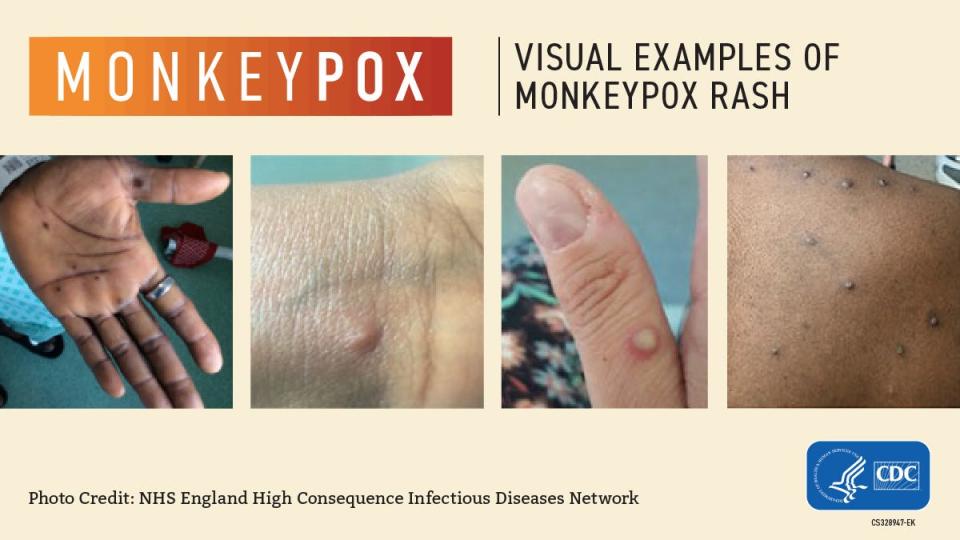WHO declares monkeypox a global health emergency. What you need to know
UPDATED ON JULY 25, 2022
PROVIDENCE – On July 23, the World Health Organization declared monkeypox a global health emergency. The announcement came as cases around the world – and in the United States and Rhode Island – continue to climb.
A Rhode Island Department of Health task force formed on July 6 continues to ramp up control and prevention measures.
Here's what Rhode Island residents need to know.
What is monkeypox?
"A rare disease caused by infection with the monkeypox virus," according to the federal Centers for Disease Control and Prevention, which states that the virus "is part of the same family of viruses as variola virus, the virus that causes smallpox. Monkeypox symptoms are similar to smallpox symptoms, but milder, and monkeypox is rarely fatal. Monkeypox is not related to chickenpox."
'Bursts of sharp jabbing pain': What it's like to have monkeypox – and the fight against stigma
How is it transmitted?
"Transmission occurs through close physical contact with body fluids, monkeypox lesions, items that have been contaminated with fluids or lesion materials (clothing, bedding, etc.), or through respiratory droplets following prolonged face-to-face contact," the state Health Department stated in a media release. "The infectious period ends when all skin sores have crusted over."

What groups are most affected?
According to a study of 528 infections in 16 countries published on July 21 in The New England Journal of Medicine, "98% of the persons with infection were gay or bisexual men, 75% were White, and 41% had human immunodeficiency virus infection; the median age was 38 years. Transmission was suspected to have occurred through sexual activity in 95% of the persons with infection."
What are the symptoms?
According to the Health Department, they can include fever, headache, muscle aches and backache, swollen lymph nodes, chills and exhaustion. Also, "a rash that can look like pimples or blisters that appears on the face, inside the mouth and on other parts of the body, like the hands, feet, chest, genitals or anus," the Health Department says.
From June: First probable case of monkeypox identified in Rhode Island
How long does a case of monkeypox last?
Typically two to four weeks.
Can monkeypox be deadly?
Yes, but such cases are extremely rare. More than 99% of people who contract the disease "are likely to survive," according to the CDC.
Why did the WHO declare a global emergency?
Speaking with reporters, Dr. Tedros Adhanom Ghebreyesus, the WHO’s director general, said "we have an outbreak that has spread around the world rapidly through new modes of transmission, about which we understand too little, and which meets the criteria” for such a declaration.
What should I do if I suspect I have monkeypox or have been in close contact with someone who has been diagnosed with the disease?
"Stay home and isolate from household members," the state Health Department advises. "Contact a health care provider as soon as possible for an evaluation. Avoid skin-to-skin, or close contact with others, including sexual contact, until a medical evaluation has been completed. Inform sex partners about any symptoms you are experiencing. Cover the rash with clean, dry, loose-fitting clothing. If contacted by public health officials, answer their questions to help protect others who may have been exposed."
Health care: Public health clinics running out of monkeypox vaccine as lines form and systems crash
What if I do not have a doctor?
"If someone doesn’t have a doctor, they can call us (401-222-2577) and we will coordinate testing for the person," Health Department spokesman Joseph Wendelken wrote in an email.
Is there a treatment for monkeypox?
Yes, the antiviral drug Tecovirimat has been approved for use.
What about a vaccine?
There is one, but it "is currently in short supply nationally," according to the Health Department. "The CDC is using a very specific formula to allocate monkeypox vaccine to states, considering factors such as population size, current monkeypox case counts, and historical data on sexually transmitted infections. For this reason, Rhode Island has been allocated much less vaccine than other states (for example, Massachusetts). At this time, Rhode Island has been allocated only enough vaccine to vaccinate close contacts of cases."
In an email to The Journal on July 25, Wendelken wrote: "We are planning for expanded vaccination efforts now."
What are the latest numbers of confirmed cases?
There are now 10 confirmed cases in Rhode Island, up from four on July 15; 79 cases in Massachusetts, up from 65 on July 15; and 2,891 nationally, up from 1,470. Note that some of the numbers reported by the CDC may lag a few days behind what individual states publish. Globally, 16,836 cases have been reported, according to the CDC.
What state has the most cases?
As of July 22, New York, with 900 cases, according to the CDC. Second was California, with 356 cases; followed by Florida with 247, Illinois with 238, Georgia with 211, the District of Columbia with 110, and Texas with 107. As of July 22, only three states had recorded just one case: North Dakota, South Dakota and West Virginia (on July 14, seven states had recorded just one case.) And as of July 22, five states had reported no cases: Alaska, Maine, Mississippi, Montana and Wyoming.
What does interim Health Department Director Dr. Utpala Bandy have to say?
"At RIDOH, we are working to help the public understand how to prevent monkeypox now, with a focus on communities at higher risk. At the same time, we are laying out future plans to get more prevention tools and resources into the community as they are made available by the federal government.”
Learn more at https://health.ri.gov/diseases/infectious/?parm=167
This article originally appeared on The Providence Journal: Monkeypox: RI task force ramps up control, prevention efforts

